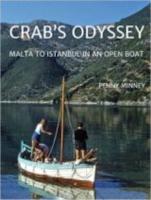
Taniwha press (2016) p/b 296pp £10.50 (ISBN 9780995469921)
In 1955 two young, female Oxford classicists with a passion for sailing, pooled their savings, searched for investors and bought a small, open lifeboat for £90 in which to sail the Mediterranean and the Greek islands. Some of their adventures in Crab, the name of their craft, were narrated in M.’s earlier memoir of her father the novelist Richard Hughes [1], but in this full-scale treatment of the voyages (1955-1958). M.’s father becomes one of a number of friends who formed the rest of the crew, two at a time. Some 60 years after their adventures, M. is able to give a detailed account from the boat’s log and an assortment of letters and recollections. Intrepid or lunatic, the voyagers faced up to some daunting conditions at sea. On land they usually met with a generous reception: ‘Zeus protects the stranger’ said the mother of a very poor family to justify their hospitality, a useful survival from the pagan classical past.
Somerville College supported them with travel grants. Their plans to understand the conditions for sailing ancient merchant ships were generally ‘a shapeless little embryo that would take on form and life as it was fed by what we met as we sailed.’ But they seemingly disprove Rhys Carpenter’s claim that only with the oar power of the penteconter could trade be conducted through the Bosporus, where the wind and strong current from the north made the straits theoretically impassable. Yet Crab succeeded with the help of a tow-rope to the shore, and they later read that before the days of diesel-engines a community had made their living by towing boats past the sharp bend where the current was strongest.
Classical references, either to the sites or the events that they evoke, are scattered through the narrative. Thus the approach to Syracuse elicits a description of the Athenian expedition, the Dardanelles Xerxes’ bridge of boats, while the Asclepieion on Kos has a justifiably scornful comment on the Italian inter-war reconstruction whose columns gleam ‘as if they were made of fondant icing and only lacked a wedding cake to stand on.’ The Odyssey is recalled—and not just in the title–as when they pass the cave reputedly the haunt of Calypso or find a ‘Cyclopean’ cave with a sheep pen inside! There are implicit classical references too: when Penny, who was steering at night, was almost overcome by cold and sleep, she avoided the fate of Palinurus [3] by biting her arm to create a distracting pain: ‘How easy just to fall asleep and drop overboard, probably taking the precious tiller with me.’ Later, on the crossing to Levkas, the same almost happened, but this time she was saved by her crew: ‘I nearly went overboard – I must have momentarily fallen asleep. What was worse, I had the tiller firmly grasped in my hand as I began to fall.’
For any classicist who might assume that the sailing season in the Mediterranean is not full of difficulties and dangers, this account of confronting whatever the sea could throw at a small open boat is salutary reminder that benign weather is only temporary, even in summer. In mid-July for example they were stuck on Lesvos: ‘For the next three days the wind blew too hard for us to venture to sea.’ Whether making good headway or becalmed and needing to deploy their engine (a luxury not afforded the ancient mariners!) or caught in rough seas and needing to seek shelter, their focus is always on currents and winds, hostile shores or sheltered bays, harbour entrances or moorings, crew members or supplies, landmarks, charts and the constant need for the upkeep of their fragile vessel. A foolhardy venture? Perhaps. A character-building adventure? Certainly. This will appeal to anyone interested in sailing the Mediterranean.
[1] Hughes, Penelope, Richard Hughes, Author, Father, Alan Sutton 1984
[2] Carpenter, Rhys, The Greek Penetration of the Black Sea, American Journal of Archaeology, Vol. 52, No. 1, 1948
[3] [Somnus] … cumque gubernaclo liquidas proiecit in undas praecipitem, Virgil, Aeneid 5.859-60
Link to Penny Minney’s website: www.pennyminney.com
Alan Beale
